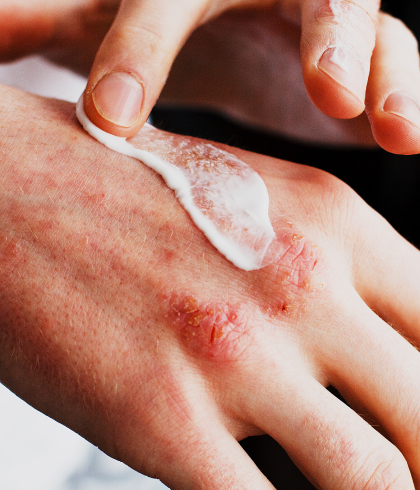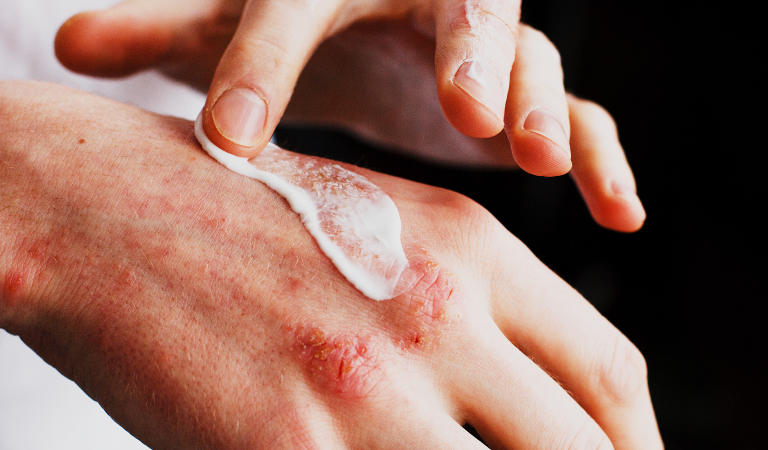

The Most Effective Home Remedies and Prevention Tips for Eczema
If you're someone who suffers from eczema, you know just how frustrating and uncomfortable it can be. Itchy, red, and inflamed skin can really put a hamper on your day-to-day life. And while there are plenty of creams and medications out there that can help manage symptoms, sometimes it's nice to turn to more natural and holistic approaches. That's where home remedies and prevention tips come in.
In this blog, we'll explore some of the most effective ways to treat and prevent eczema from the comfort of your own home. From soothing home remedies for eczema like oatmeal baths to stress-reducing meditation techniques, we've got you covered. So, let's dive in and find some relief from that pesky eczema!
Types of Eczema
Eczema, also known as atopic dermatitis, is a chronic skin condition that causes dry, itchy, and inflamed skin. There are several different types of eczema, including atopic dermatitis, contact dermatitis, dyshidrotic eczema, nummular eczema, and seborrheic dermatitis.
- Atopic dermatitis is the most common type of eczema, affecting up to 20% of children and 3% of adults. It usually appears as a red, itchy rash on the face, hands, and feet, but can occur anywhere on the body.
- Contact dermatitis is a type of eczema that develops when the skin comes into contact with an irritant or allergen, such as poison ivy, metals, or certain chemicals. It can cause redness, swelling, and blistering.
- Dyshidrotic eczema is a type of eczema that affects the hands and feet and is characterized by small, fluid-filled blisters. It can be triggered by stress, allergies, or exposure to chemicals.
- Nummular eczema, also known as discoid eczema, causes round, coin-shaped patches of itchy skin. It can be triggered by dry skin, stress, or certain medications.
- Seborrheic dermatitis, also known as cradle cap in babies, is a type of eczema that causes yellow, scaly patches on the scalp, face, and other oily areas of the body. It can be triggered by stress, hormones, and certain medications.
Causes and Symptoms
Eczema is a skin condition that can cause redness, itching, and inflammation. Here are some of the causes and symptoms of eczema:
Causes:
- Genetics: Eczema can be inherited from parents who have a history of eczema, asthma, or allergies.
- Environmental factors: Exposure to certain irritants or allergens, such as soaps, detergents, wool, or pollen, can trigger eczema.
- Immune system dysfunction: Eczema can be caused by an overactive immune system, which triggers inflammation and irritation.
Symptoms:
- Itchy, red, and inflamed skin: The affected areas of the skin may be rough and scaly, and can appear as small bumps or patches.
- Dry, sensitive skin: Eczema can cause the skin to become dry and easily irritated, making it more susceptible to cracking and bleeding.
- Swollen or thickened skin: In more severe cases, the affected skin may become thickened, leathery, or cracked.
- Blistering or oozing: In some cases, eczema can cause the skin to blister and ooze clear or yellow fluid.
- Discoloration: Over time, areas of the skin affected by eczema may become darker or lighter in color.
- Body parts it affects: Eczema can occur on any part of the body, but it is most commonly found on the hands, feet, face, and the creases of the elbows and knees. In infants, it may appear on the cheeks, scalp, or chest.
It's important to note that the severity and type of symptoms of eczema can vary from person to person. Some people may experience only mild symptoms, while others may have severe itching and discomfort. It's important to see a homeopathic dermatologist if you suspect that you have eczema, in order to receive an accurate diagnosis and appropriate treatment.
Prevention
Eczema cannot always be prevented, especially if it is due to genetic or immune system factors. However, there are some steps you can take to reduce your risk of developing eczema or to prevent flare-ups if you already have the condition. Here are some tips for preventing eczema:
- Identify and avoid triggers: Keep track of any factors that seem to trigger your eczema, such as certain foods, detergents, fabrics, or stress. Try to avoid or minimize your exposure to these triggers.
- Moisturize regularly: Apply a gentle, fragrance-free moisturizer to your skin every day, especially after showering or bathing. This can help keep your skin hydrated and less prone to irritation.
- Use mild products: Choose gentle, hypoallergenic products for your skin, such as soaps, shampoos, and laundry detergents. Avoid products that contain fragrances, dyes, or harsh chemicals that can irritate the skin.
- Dress appropriately: Wear loose-fitting, breathable clothing made from soft fabrics like cotton. Avoid wearing wool or other materials that can irritate the skin.
- Avoid scratching: Scratching can worsen eczema symptoms, so try to avoid scratching and use cold compresses or anti-itch creams instead.
Home Remedies
Home remedies for eczema may offer temporary relief, it's important to remember that they may not work for everyone, and they are not a substitute for medical treatment. Here are five home remedies that may provide temporary relief for eczema:
- Oatmeal baths: Adding colloidal oatmeal to your bathwater can help soothe and moisturize the skin. Colloidal oatmeal can be found in drugstores or health food stores.
- Coconut oil: Applying coconut oil to the affected areas can help moisturize the skin and reduce inflammation. However, some people may be allergic to coconut oil, so it's important to test a small area of skin before using it more widely.
- Aloevera: Applying aloevera gel to the affected areas can help soothe itching and inflammation. Look for pure aloe vera gel or extract, as some commercial products may contain added ingredients that can irritate the skin.
- Apple cider vinegar: Diluting apple cider vinegar with water and applying it to the affected areas may help reduce itching and inflammation. However, it's important to test a small area of skin first, as vinegar can be irritating to some people.
- Tea tree oil: Applying diluted tea tree oil to the affected areas can help reduce inflammation and itching. However, tea tree oil can be irritating to some people, so it's important to test a small area of skin before using it more widely.
It's important to remember that home remedies may offer only temporary relief for eczema symptoms, and they are not a substitute for medical treatment. If you have eczema, it's important to see a homeopathy dermatologist for proper diagnosis and treatment. They can help you develop a personalized eczema treatment in homeopathy that may include medication, and lifestyle changes, to manage your symptoms and prevent flare-ups.
Homeopathic Treatment for Eczema
Eczema is a chronic skin condition that can cause discomfort and embarrassment for those who suffer from it. Homeopathic treatment for eczema has been growing in popularity as a safe and natural eczema treatment.
Individualized Treatment: Homeopathic treatment is highly individualized and tailored to the unique symptoms and needs of each person. This means that a homeopathic practitioner will take the time to understand your specific case of eczema and create a customized treatment plan that addresses your individual needs.
- Natural and Non-Toxic: Homeopathic remedies are made from natural substances and are highly diluted, making them safe and non-toxic. This is in contrast to traditional treatments, which may have harmful side effects.
- Improvements in Symptoms: Many people with eczema have reported improvements in their symptoms after starting homeopathic treatment. This can include a reduction in itching, redness, and inflammation, as well as an overall improvement in the appearance and texture of the skin.
- Long-Term Results: Homeopathic treatment aims to address the root cause of eczema, rather than just treating the symptoms. This can lead to long-term results, as the treatment is designed to help the body heal itself from the inside out.
- Fewer Recurrences: Homeopathic eczema treatment can also help to prevent the recurrence of eczema by strengthening the immune system and addressing any underlying issues that may be contributing to the condition.
- Personalized Lifestyle Recommendations: In addition to homeopathic remedies, a homeopathic practitioner may also provide personalized lifestyle recommendations to help manage eczema. This can include dietary changes, stress management techniques, and other natural remedies.
Overall, homeopathic treatment for eczema offers promising eczema treatments. According to NCBI, people have reported positive results and improvements in their symptoms. If you're interested in trying homeopathic treatment for eczema, be sure to consult with a qualified homeopathic doctor who can provide personalized recommendations and guidance.
Key Takeaways
- Eczema is a chronic skin condition causing dry, itchy, and inflamed skin, with several types like atopic dermatitis and contact dermatitis.
- Causes of eczema include genetics, environmental factors, and immune system dysfunction, with symptoms like itchy, red skin and blistering.
- Prevention tips include avoiding triggers, moisturizing regularly, using mild products, wearing soft clothing, and avoiding scratching.
- Home remedies for temporary relief include oatmeal baths, coconut oil, aloe vera, apple cider vinegar, and tea tree oil, but they are not substitutes for medical treatment.
- Homeopathic treatment is personalized, natural, and aims for long-term results by addressing the root cause, with fewer recurrences and lifestyle recommendations.

